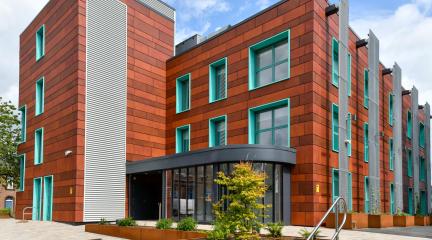
Westmorland and Furness Council’s new service hub in Penrith has received its PassivHaus EnerPHit certification, meaning it is the first building of this type in the UK to achieve this standard of energy efficiency by retrofit.
The certification was awarded to Voreda House by accredited Passivhaus Certifiers Etude, who issue the award in recognition of buildings that have ‘the best internal comfort, minimal impact on the environment, the lowest operating cost’ and are compliant with the strict criteria associated with PassivHaus building standards.
During the first four months of operation (May to August) the building has already demonstrated a high level of savings in cost and energy consumption. Energy usage has dropped by over 68%, saving over £15,000 compared to the same period in 2023 for combined electricity and gas expenditure at Penrith Town Hall and Mansion House.
Dubbed “the world’s leading standard in energy efficient design”, the German-conceived Passivhaus standard is becoming well known and increasingly popular with UK builders. To become Passivhaus certified, new buildings must be constructed, or as was the case with Voreda House, an existing structure should be retrofitted, according to strict requirements for insulation, ventilation and heat retention.
The existing municipal office building was wrapped in insulation externally to improve the offices thermal performance and comfort. The pre-cast concrete roof was overlaid with insulation and the concrete panelling on the outside of the building was removed and replaced with a steel frame system, which holds a carrying panel with stone wool insulation to insulate the building externally. External wall insulation (EWI) was extended down into the ground to minimise thermal bridging at the building’s foundations. Externally, the building has been clad with a lightweight dry-cassette cladding system.
The building’s heating and cooling is provided by air source heat pumps. Solar panels on the roof are estimated to generate around a third of the building’s energy requirements. Considerably improved air tightness, greater thermal insulation and triple glazing all contribute to the building’s energy efficiency.
Cllr Giles Archibald Westmorland and Furness Council’s Cabinet Member for Climate, Biodiversity and Environmental Services said:
“By adhering to Passivhaus criteria in the retrofit of Voreda House, energy savings following its completion are contributing positively to the council’s commitment to reducing its carbon footprint and providing leadership in the drive to be carbon net zero.
“The benefits of building in this way will result in a consistent supply of fresh air throughout the building, meaning higher quality and more hygienic air supply. The durability of the building has been improved as well as the significant reduction in costs to heat and cool the building.”
A full range of public-facing services are represented at Voreda House, from Children’s Services and Adult Social Care to Housing, Public Health, Trading Standards and Waste, delivering on Westmorland and Furness Council’s commitment to keeping its services close to the public.
Cllr Peter Thornton, Westmorland and Furness Council’s Cabinet Member for Highways and Assets, said:
“Having the first UK retrofit building of this type to gain PassivHaus EnerPHit certification within our portfolio of assets is a massive achievement for Westmorland and Furness Council.”
“Voreda House is being presented as a positive case study within the construction and decarbonisation industries and is featured as an outstanding example at the 2024 UK Passivhaus Conference. It reflects our ambition to manage our buildings in a modern, positive and environmentally efficient way. ”
Pictured: Cllr Giles Archibald, Cllr Peter Thornton, Allan Harty, Assistant Director for Corporate Assets, Fleet & Capital Programme.
